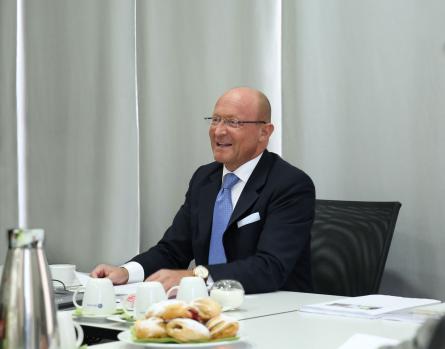
Neumarkt, Düsseldorf, 2/3 March 2017 – With a significant increase of 5.7 per cent in pharmacy sales(1) in Germany Bionorica once again enjoyed above-average growth compared with the competition in the last fiscal year 2016 (pharmaceutical market + 1.9 per cent(2), OTC market + 2.3 per cent(3)).
Despite a rather below-average cold and flu season, the market leader for herbal respiratory tract medications was able to further extend its leading position in Germany. Sinupret®, Germany's most successful herbal cold remedy, has now achieved a market share of around 66 per cent (pharmacy sales by revenue in Euro(4)). Other revenue drivers were the immune system stimulant Imupret®, the cough mixture Bronchipret® and Canephron® for urinary tract infections.
Professor Michael A. Popp, owner and CEO of Bionorica, believes the company is on the right track: ”The sustained success we have been seeing for years vindicates and encourages us to continue to research the healing power of nature with the greatest degree of scientific commitment. We are looking very optimistically to the future."
On the global stage, Bionorica continued to advance in its main markets. In Russia, despite recession and declining purchasing power, the market share, measured against pharmacy package sales, could be increased5) to 8.2 per cent. Canephron®, Sinupret® and Mastodynon® top the list of medications most prescribed by doctors for the respective symptoms by a clear margin.
In Ukraine (+12.9 per cent(6)), Poland (+ 31.8 per cent(7)) and Austria (+9 per cent(8)) Bionorica was also able to grow disproportionately to the market. ”We are especially proud of developments in Russia and Ukraine, despite very difficult times. We were able to navigate successfully through the crisis with our partners thanks to a very moderate pricing strategy with a long-term focus,” says Professor Popp.
Despite the difficult economic conditions in Russia and Ukraine, the Bionorica Group achieved provisional net sales of just under EUR 254 million in the last fiscal year 2016, representing an increase of around 3 per cent over the previous year(9). Adjusted for exchange rate fluctuations, this is equivalent to around EUR 304 million, representing an increase of around 30 per cent since 2014. With an equity ratio of 77 per cent, the company is well equipped for further organic growth. Against this background, the planned measures to further develop the eastern European market are being expedited.
The company's sustained success is also reflected in its headcount. In 2016 the workforce grew yet again by 4 per cent. At the end of 2016 Bionorica employed a total of 1,532 people.
Bionorica attributes its growing national and international successes over the years to its unique research and manufacturing strategy. The well-resourced 'phytoneering programme' is emblematic of our globally networked scientific research, the development of our own varieties of medicinal plants, patented manufacturing methods and recognised clinical studies that meet the most stringent international standards.
Professor Popp describes the law on reimbursable medical cannabis to relieve the symptoms of severely ill patients, which was passed in mid-January 2017, as a milestone for patients. Bionorica, which has been conducting research on cannabinoids (the active ingredients of cannabis) since 2002, is assuming a pioneering role in this field. As well as the active ingredient Dronabinol, with uses such as countering nausea, vomiting or loss of appetite from cancer treatment or spasms in multiple sclerosis sufferers, the company also produces natural and synthetic Cannabidiol (CBD). For CBD there are indications that it can be used for therapeutic purposes in future for certain forms of epilepsy and for schizophrenia. Further studies on these active ingredients are being planned. The aim is to develop and produce corresponding proprietary medicinal products.
Sources:
1. Insight Health ApoFusion, Apothekenabverkauf nach Umsatz in Euro zum Endverbraucherpreis (Pharmacy sales by revenue in Euro at consumer price)
2. Apothekenmarkt: In Apotheken abverkaufte Produkte (Products sold in pharmacies)
3. OTC-Markt: Arzneimittel, Phytopharmaka, Diätetika, Homöopathie, Medizinprodukte, Nahrungsergänzung und Anthroposophie (Medicinal products, phyto-pharmaceuticals, dietary products, homoeopathy, medical devices, nutritional supplements and anthroposophy)
4. Insight Health ApoFusion, Apothekenabverkauf nach Umsatz in Euro zum Endverbraucherpreis (Pharmacy sales by revenue in Euro at consumer price)
5. DSM, Apothekenabverkauf nach Absatz in Packungen (Pharmacy package sales)
6. Morion, Apothekenabverkauf nach Absatz in Packungen (Pharmacy package sales)
7. Pharma Expert, Apothekenabverkauf nach Absatz in Packungen (Pharmacy package sales)
8. IMS Health, Apothekenabverkauf nach Absatz in Packungen (Pharmacy package sales)
9. own data, SAP-supported